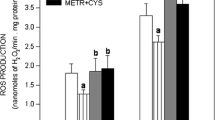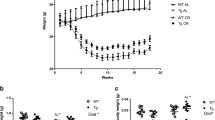Abstract
Many previous investigations have consistently reported that caloric restriction (40%), which increases maximum longevity, decreases mitochondrial reactive species (ROS) generation and oxidative damage to mitochondrial DNA (mtDNA) in laboratory rodents. These decreases take place in rat liver after only seven weeks of caloric restriction. Moreover, it has been found that seven weeks of 40% protein restriction, independently of caloric restriction, also decrease these two parameters, whereas they are not changed after seven weeks of 40% lipid restriction. This is interesting since it is known that protein restriction can extend longevity in rodents, whereas lipid restriction does not have such effect. However, before concluding that the ameliorating effects of caloric restriction on mitochondrial oxidative stress are due to restriction in protein intake, studies on the third energetic component of the diet, carbohydrates, are needed. In the present study, using semipurified diets, the carbohydrate ingestion of male Wistar rats was decreased by 40% below controls without changing the level of intake of the other dietary components. After seven weeks of treatment the liver mitochondria of the carbohydrate restricted animals did not show changes in the rate of mitochondrial ROS production, mitochondrial oxygen consumption or percent free radical leak with any substrate (complex I- or complex II-linked) studied. In agreement with this, the levels of oxidative damage in hepatic mtDNA and nuclear DNA were not modified in carbohydrate restricted animals. Oxidative damage in mtDNA was one order of magnitude higher than that in nuclear DNA in both dietary groups. These results, together with previous ones, discard lipids and carbohydrates, and indicate that the lowered ingestion of dietary proteins is responsible for the decrease in mitochondrial ROS production and oxidative damage in mtDNA that occurs during caloric restriction.
Similar content being viewed by others
Abbreviations
- 8-oxodG::
-
8-oxo-7,8-dihydro-2’-deoxyguanosine
- CR::
-
caloric restriction
- mtDNA::
-
mitochondrial DNA
- nDNA::
-
nuclear DNA
- ROS::
-
reactive oxygen species
References
1 Archer VE (2003) Med Hypoteses 60:924–929
2 Asunción JG, Millan A, Pla R, Bruseghini I, Esteras A, Pallardo FV, Sastre J, Viña J (1996) FASEB J 10:333–338
3 Barger JL, Walford RL, Weindruch R (2003) Exp Gerontol 38:1343–1351
4 Barja G (2002) J Bioenerg Biomembr 34:227–233
5 Barja G (2004a) Free radicals and aging. Trends Neurosci 27:595–600
6 Barja G (2004b) Biol Rev 79:235–251
7 Barzilai N, Gabriely I (2001) J Nutr 131:903S–906S
8 Beckman KB, Ames BN (1998) Physiol Rev 78:547–581
9 Dalderup LM, Visser W (1969) Nature 222:1050–1052
10 Doi SQ, Rasaiah S, Tack I, Mysore J, Kopchick JJ, Moore J, Hirszel P, Striker LJ, Striker GE (2001) Am J Nephrol 21:331–339
11 Gredilla R, Barja G, López-Torres M (2001a) J Bioenerg Biomembr 33:279–287
12 Gredilla R, Sanz A, López-Torres ML, Barja G (2001b) FASEB J. 15, 1589–1591
13 Gredilla G, Barja G (2005) The role of oxidative stress in relation to caloric restriction and longevity. Endocrinol 146:3713–3717
14 Iwasaki K, Gleiser CA, Masoro EJ, McMahan CA, Seo EJ, Yu BP (1988) J Gerontol 43:B13–B21
15 Khorakova M, Deil Z, Khausman D, Matsek K (1990) Fiziol Zh 36:16–21
16 Kubo C, Johnson BC, Gajjar A, Good RA (1987) J Nutr 117:1129–1135
17 Kujoth GC, Hiona A, Pugh TD, Someya S, Panzer K, Wohlgemuth SE, Hofer T, Seo AY, Sullivan R, Jobling WA, Morrow JD, Van Remmen H, Sedivy JM, Yamasoba T, Tanokura M, Weindruch R, Leeuwenburgh C, Prolla T (2005) Science 5:71–79
18 Latorre A, Moya A, Ayala A (1986) PNAS USA 83:8649–8653
19 Loft S, Poulsen HE (1999) Methods Enzymol 300:166–184
20 López-Torres M, Gredilla R, Sanz A, Barja G (2002) Free Rad Biol Med 32:882–889
21 Maeda H, Gleiser CA, Masoro EJ, Murata I, maman CA, Yu BP (1985) J Gerontol 40:671–688
22 Mair W, Piper MD, Partridge L (2005) PloS Biol 3:1305–1311
23 Masoro EJ (1990) Proc Soc Exp Biol Med 193:31–34
24 Masoro EJ (2000) Caloric restriction and aging: an update. Exper Gerontol 35:299–305
25 Mlekusch W, Lamprecht M, Ottl, K, Tillian M, Reibnegger G (1996) Mech Ageing Dev 92:43–51
26 Murtagh-Mark CM, Reiser KM, Harris R Jr, McDonald RB (1995) J Gerontol 50A:B148–B154
27 Muurling M, Jong MC, Mensink RP, Hornstra G, Dahlmans VEH, Hanno P, Voshol PH, Havekes LM (2002) Metabolism 51:695–701
28 Orentreich N, Matias JR, DeFelice A, Zimmerman JA (1993) J Nutr 123:269–274
29 Pamplona R, Barja G (2006) Biochim Biophys Acta Bioenerg (In press)
30 Piper MD, Mair W, Partridge L (2005) J Gerontol A 60:549–555
31 Ramsey JJ, Hagopian K, Kenny TM, Koomson EK, Bevilacqua L, Weindruch R, Harper ME (2004) Am J Physiol 286:E31–E40
32 Richardson A, Liu F, Adamo ML, Van Remmen H, Nelson JF (2004) Best Pract Res Clin Endocrinol Metab 18:393–406
33 Richie JP Jr, Leutzinger Y, Parthasarathy S, Malloy V, Orentreich N, Zimmerman JA (1994) FASEB J 8:1302–1307
34 Rodrigues MAM, Sanchez-Negrette M, Mantovani MS, Santana LS, Angeleli AYO, Montenegro MR, de Camargo JLV (1991) Food Chem Toxicol 29:757–764
35 Ross MH (1976) In: Winick M (ed) Nutrition and Aging. Wiley, New York, pp 43–57
36 Sanz A, Caro P, Barja G (2004) J Bioenerg Biomembr 36:545–552
37 Sanz A, Caro P, Ibañez J, Gómez J, Gredilla R, Barja G (2005a) J Bioenerg Biomembr 37:83–90
38 Sanz A, Gredilla R, Pamplona R, Portero-Otín M, Vara E, Tresguerres JAF., Barja G (2005b) Biogerontol 6:15–26
39 Sanz A, Caro P, Gómez J, Barja G (2006a) Ann NY Acad Sci (In press)
40 Sanz A, Caro P, Ayala V, Portero-Otin M, Pamplona R, Barja G (2006b) FASEB J (In press)
41 Shimokawa I, Higami Y, Yu BP, Masoro EJ, Ikeda T (1996) Aging Clin Exp Res 8:254–262
42 Yamaki K, Ide T, Takano-Ishikawa Y, Shinohara K (2005) Biosci Biotechnol Biochem 69:13–18
43 Youngman LD, Park JYK, Ames BN (1992) PNAS USA 89:9112–9116
44 Zimmerman JA, Malloy V, Krajcik R, Orentreich N (2003) Exp Gerontol 38:47–52
Author information
Authors and Affiliations
Corresponding author
Rights and permissions
About this article
Cite this article
Sanz, A., Gómez, J., Caro, P. et al. Carbohydrate restriction does not change mitochondrial free radical generation and oxidative DNA damage. J Bioenerg Biomembr 38, 327–333 (2006). https://doi.org/10.1007/s10863-006-9051-0
Published:
Issue Date:
DOI: https://doi.org/10.1007/s10863-006-9051-0




